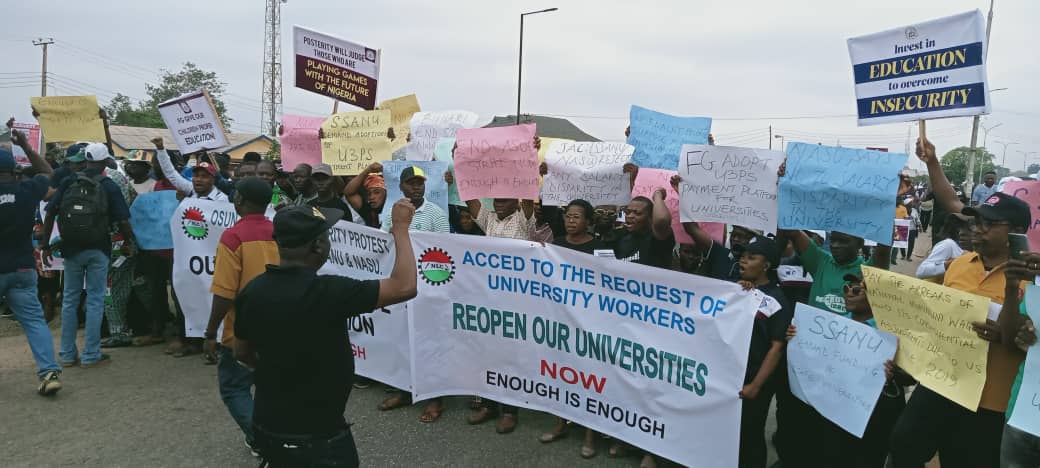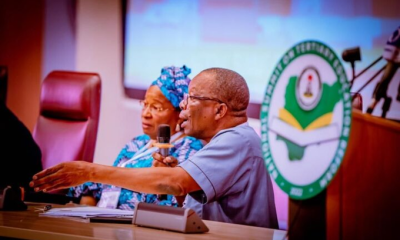Education in Nigeria
Six months into ASUU strike: How lecturers are surviving

By ADEBAYO OBAJEMU
The ongoing strike by the Academic Staff Union of Universities, ASUU, which is over six months old has spawned a welter of unintended consequences, which will have dire implications for the future of undergraduates, and tertiary education in Nigeria.
Investigations by Business Hallmark revealed that when ASUU eventually resumes, many of the brightest academics will be missing in action. Competent sources at many of the public universities confided in this medium that some lecturers have relocated to universities in North America, mainly Canada, the United States; while others have found new haven in Europe, while some have gone to South Africa as well as Nigerian private varsities.
Dr. Olufemi Omoyele, director of Entrepreneurship at Redeemers University, told Business Hallmark that “I have a friend, a close friend who until about two months ago was an important faculty member in one of the public universities in the Southwest, he has now relocated to the University of Nairobi; and there is another one who left the shores of the country for University of Botswana. This strike has spawned another wave of brain drain”.
Similarly, Dele Ashiru, the chapter chairman of ASUU at the University of Lagos said that more than 70 percent of the lecturers have left the country for greener pasture.
Ashiru made this public recently in an interview on Arise Television where he affirmed that no government in the history of the country has been so disrespectful and insensitive to the best brains in the country.
“The impact of the government’s insensitivity and deployment of the weapon of hunger might not be immediately known until after the strike. As I speak with you, more than 70 percent of bright and promising young academics retained by the university through mentorship have all left the country for greener pastures due to the poor conditions of service in Nigeria.
“Those that are left are on the verge of leaving. No government in the history of Nigeria has been so insensitive, brash, and disrespectful of the best brains in the country. This is unfortunate and a shame.
“ASUU is a union of intellectuals; we don’t look at what others do to make our decisions. We make our decisions based on verifiable facts and the facts available to us have not shown this government to be a responsible and sensible one,” he said.
Emmanuel Osodeke, a professor, and the national president of the Academic Staff Union of Universities (ASUU) last week sounded the alarm over the mass resignation of lecturers from the nation’s universities for greener pastures both within and abroad as the strike lingers.
Osodeke at a Obafemi Awolowo University’s function bemoaned the new wave of intellectuals migrating elsewhere for greener pastures, adding that some of their members are being forced to go into other sources of livelihood over the federal government’s refusal to meet some of their demands, including payment of seven months’ backlog of salaries accrued during the strike.
According to him, some of them are now engaged in farming and other economic activities, while a large number have left the country.
“So many lecturers are leaving to engage in farming and others; lecturers are tired of the treatment they’re receiving from the government and because of this, they are looking for alternatives. So many more will leave even after the strike too.
‘’I pity the country; Nigeria will be the loser for it. Instead of coming to the table; look at how they will solve the issue, rather, they believe in punishing lecturers.
“It’s so sad. Your lecturers went on strike, you believe they will become hungry and come back to beg. Many lecturers will also leave to venture into other areas; some are also looking at becoming self-employed,” he said.
There seems to be no end in sight for the protracted crisis. Sources said even before the current crisis, many of the public universities’ lecturers engage in moonlighting by teaching in private universities.
The reason for this, according to investigations, is that many of the private universities are said to be ‘glorified varsities’ without enough teaching staff. They are said to lack standard, and many of their faculty members are borrowed on adjunct basis from public universities.
The idea for private universities which was mooted and actualised by the federal government in 1999, was to bolster university education and improve wider access for many students. But that has not happened given the alleged poor standard in private universities, the only silver lining is stable academic calendar according to sources.
After two decades, private-sector investment in the acceleration of university education in Nigeria has been significant.
Almost every year, at least one new private university is established somewhere in the country. Within the first five months of 2022 alone, 12 private universities were approved by the National Universities Commission (NUC), the regulatory body of universities in Nigeria.
With the latest additions, the number of private universities has shot up to 111, representing 51% of the total of 217 universities in the country, according to NUC figures.
Despite the number of private universities, education analysts say the private sector has not substantially advanced access to university education for students.
Professor Adeagbo Moritiwon, a political scientist, blamed the poor standard of private universities on lack of competent academic staff.
According to 2022 statistics, there are 102,500 students in private universities compared to 1,751,761 in public universities, implying that the private sector commands less than 6% of the university student population in Nigeria.
Professor Jibrin Ibrahim, a senior fellow at the Centre for Democracy and Development, in a recent article said “private universities have not really recruited and trained their own faculties. They poach from the public sector for staff and are dependent on moonlighting.”
Ibrahim averred that the “terrible story” that has come out from the higher education sector is that many public university lecturers, who are more often absent, and rarely seen by their students, is that they go to private universities to teach because of the extra money in form of moonlighting.
Eminent historian, Prof. Toyin Falola of the University of Texas, Austin, United States, in an article recently in “University World News” noted that it is an ingrained systemic flaw for some staff members at public universities to also work at private universities.
However, Prof. Tolu Odugbemi, the former vice-chancellor of the University of Lagos said that many public lecturers rely on moonlighting because of poor pay in the public sector.
“You see Nigerian lecturers moving from one place to another to improve their pay and make ends meet because the conditions of service [at public universities] are not good,” he said.
“It is pathetic that higher education in Nigeria has been highly debased. Do not let us deceive ourselves, things have collapsed and the challenge is for everyone to start rebuilding the system,” said Odugbemi.
When we talk of poor pay, lecturers with doctorate degree are said to earn as little as NGN130,000 (US$313) per month, while professors on the last bar of professorship salary and decades of experience earn around NGN550,000 (US$1,327), according to the Consolidated University Academic Staff Salary Structure II (CONUASS II), the payment scale developed by the National Salaries, Incomes and Wages Commission for all academic staff members in all federal government universities.
The salaries are far lower than those of lecturers in some countries in Africa, North America and Europe earn, according to a report by the Centre for Democracy and Development.
A lecturer at the University of Ilorin who craved anonymity told Business Hallmark that the “poor pay has led some of us to actively seek extra stints at private universities while some of us have actually gone abroad”.
Apart from poor pay, Odugbemi, the former vice-chancellor of UNILAG, said that poor funding for universities and poor infrastructure on campuses have made many public university staffers lose their passion for teaching in public universities.
In joint research, Dr Yusuf Suleiman of Al-Hikmah University Ilorin, Professor Zahyah Hanafi of Taylor’s University in Malaysia and Dr. Muhajir Taslikhan of Universiti Utara, Malaysia say that the solution to the shortage of qualified and competent lecturers in private universities would be collaboration between the government and the private sector.
“Government should endeavour to assist private universities in the area of staff capacity-building and infrastructure,” a statement jointly issued by the research collaborators averred.
There has been a clamour for government assistance to private universities for years. Many stakeholders want private universities, like their public counterparts, to have access to the Tertiary Education Trust Fund, or TETFUND, a scheme established in 2011 to disburse, manage and monitor education tax to government-owned tertiary institutions in Nigeria. The fund caters for infrastructure and research projects in tertiary institutions.
But, although the government has been not comfortable with the idea, their reason being that their owners should continue to cater to their own needs, those who feel government should help train their manpower have not let up.
Sources at the federal ministry of education say government is considering proscribing, or at worst give official recognition to Congress of Nigerian Academics, CONUA, to weaken the power and influence of ASUU.






